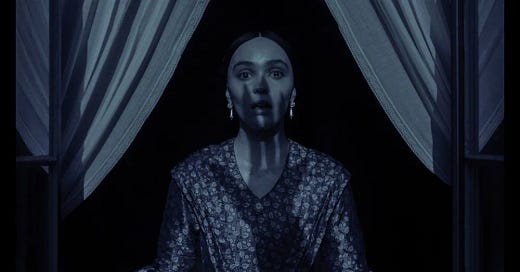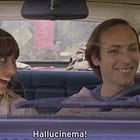Take My Wife, Please!: 'Nosferatu'
A gorgeous interpretation of a silent classic knock-off. Truly gorgeous. And evil.
Dear Moviegoers,
Actress Fay Wray was lovely in the original King Kong, especially when the titular giant Gorilla stalked her through the streets and skyscrapers of New York City. A classic horror film “Final Girl” she was. Did we see her through Kong’s eyes or Kong through her eyes? I like to think all of the above, though this may be problematic in hindsight. “It was beauty that killed the beast” was stated by the in-story director and adventure charlatan, moments after Kong fell from the Empire State Building, after giving up and saving the love that was his blonde starlet.
Was it love? Was it rapture? He had a heart, but…
Roughly a century later, after many King Kong adaptations, quite a few vampire flicks have fallen upon us all. Vampires, those romantic bloodsuckers, share some common obsessions with the loveable ape. A male gaze, as it were. And few obsessive beings are as creepy and horrific as in the Dracula knock-off, Nosferatu.
I’ve spent two-ish paragraphs already setting up this review by way of an observation of King Kong’s interest in a single woman, and honestly, I could go further. In their ways, both films—the original versions separated by a decade and the new versions released just a few months apart—are linked by twisted visions of love and ultimate tragedy through coercing young ladies into taking part in a final sordid testament.
Filmmaker Robert Eggers, I feel, has crafted a version of Nosferatu that matches King Kong’s initial horror and eventual beauty through love most forbidden. It’s a startling take that burrows under the skin and refuses to leave without a struggle. Without being pulled out by an instrument. By force.
Nosferatu is an interpretation of the vampire mythos that couldn’t be more demonic or evil if it tried. In the film, Count Orlok—the titular Nosferatu—is a walking corpse with unnatural powers, living alone in a decrepit castle, accompanied only by the stench of death from the caskets of previous generations. He is brought to life by the call of Ellen, who, since her more impressionable years, has begged for affection in any form. She is now married to a good if naive man, who is suckered into bringing Orlok to his town and ever closer to his newlywed.
As performed by Bill Skarsgard, Orlok is a disgusting and menacing figure, speaking in the kind of deep tones that rattles bones. It’s the kind of acting that doesn’t require deep method behind the scenes, but does bring about a measure of tormenting attitude out of any man, especially the respectable ones. He’s more than scary; he’s real. He’s the embodiment of imposing force. He is Marvel’s Thanos, only instead of being genocidal, he’s a sex and blood pest.
This Nosferatu isn’t all performance, but everything here does lead back to the acting. From the shadows to the composures, from the pale life-draining lighting to the contortions of the cinematography, Nosferatu may honor the previous episodes by directors F.W. Murnau and Werner Herzog, but Robert Eggers and crew go for broke with a new variation, using modern technique and sensibilities. It’s certainly a movie for the moment. Contemporary completely.
Through actress Lily-Rose Depp, who has taken on roles from the simply silly (Yoga Hosers) to the awfully demanding (The Idol), Nosferatu is an accomplishment of tragic heroism. It’s the only way it could ever be like that, as the defeat of a monster must come from someone most vulnerable but pure. Lily-Rose is unimaginable and unrecognizable throughout the film, floating from scene to scene, possessed and yet in total control—a feat that must’ve been so difficult to present. Her Ellen is under Orlok’s charm/sway sometimes, but here and there is of sound mind and body when letting him in, granting access to her body but not to her will. That’s still her own, even though it’s being tossed asunder. Agency? Only in how much she likes this. How much? I shiver at finding an answer.
Taboo. Grace in the hard to fathom. Beauty in the grossness of sickening thought. There’s a word for this, but I refuse to type it. Nosferatu goes harder than King Kong and puts “It was beauty that killed the beast” into a shocking context, right up to that final shot. Both films are, yes, iconic, pushing the limits of the times they were made in. Nosferatu had to do more because we demand more from our media. From our movies. I hope audiences won’t regret just how deep they’ll be taken. I for one am ok with that.
Beware. 5/5
Nosferatu is now playing in theaters.
Sincerely Yours in Moviegoing,
⚜️🍿
If you liked this article, enjoy a few previous ones:











I just saw Nosferatu last night and this morning I am reading review after review. Some are trite, some are sexist, some are dismissive. Yours is excellent! Thank you.
That title made me laugh.